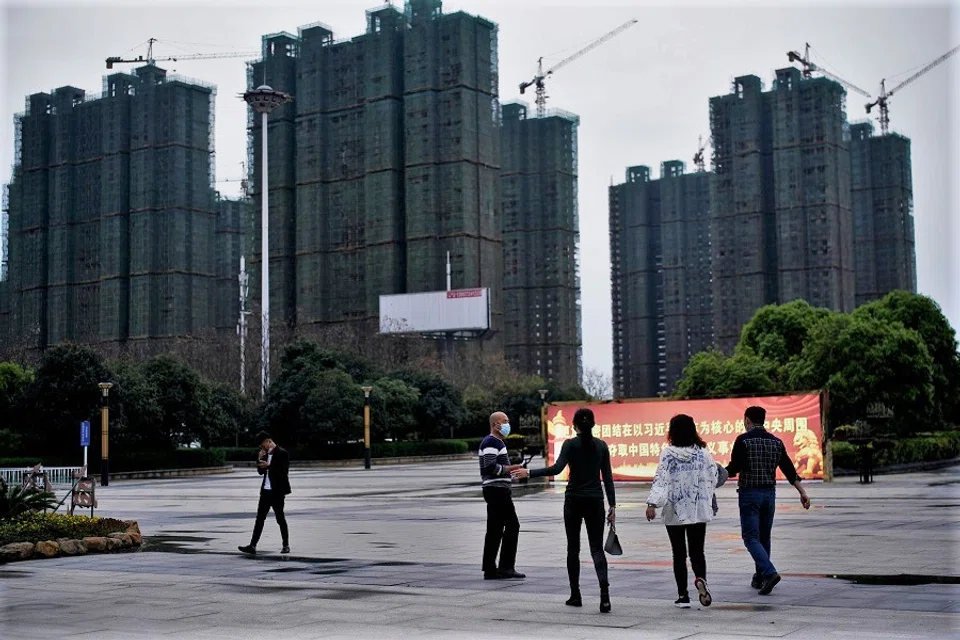Property now a liability for China's middle class
With salary cuts, housing loans on their backs and little means of generating cash flow, middle-class workers across China's cities are walking the tightrope of trying to maintain their living standards while keeping up with their mortgage payments. The recently-announced stimulus plan may not solve their housing woes either.

Cai Hua (not her real name), a white-collar worker in Guangzhou, had just gotten the keys to her new property in the suburbs last year. She intended to rent out the place this year, but who could have foreseen that potential tenants would stop going for house viewings in the wake of a catastrophic viral outbreak? With the property yet to be taken up by anyone, she still needs to make payments on the housing loan. Add to that the rental she pays for her city district apartment, and she ends up having to spend nearly 10,000 RMB (S$1,995) per month on housing.
To make matters worse, due to business being affected by the coronavirus outbreak, the IT consultancy firm she works for has cut the salaries of the entire staff by 20% since March. After deductions for her housing loan payment and rental, the remainder of her monthly income is just enough for day-to-day expenses. Here is a middle-class white-collar worker who used to visit beauty salons and gyms from time to time, now suddenly reduced to a "home mortgage slave" who has to tighten her belt on a daily basis.
Property now a liability
Cai Hua tells Lianhe Zaobao that moving to her new suburban property would help her save on rental expenditure, but it would also mean spending an additional hour and a half every day on commuting. She is concerned about how her work might be affected as a result.
Close to 60% of the entire country's households are saddled with debt.
"The most important thing now is to keep my job. Otherwise, I wouldn't even be able to finance the property."

According to a survey released last month by the People's Bank of China on urban household assets and liabilities, housing loans are the main source of debt pressure for Chinese households. Close to 60% of the entire country's households are saddled with debt. Every household bears a housing loan of around 389,000 RMB on average, which constitutes 76% of the total household liabilities. Those in a similar plight as Cai Hua - that is, those who have a property and fixed bills to pay - face a higher debt risk. The coronavirus outbreak only pushes the risk even higher.
Compared to those with housing loans in the big cities, workers who have land and homes to fall back on in the countryside are on firmer footing in the face of the coronavirus crisis.
Although Cai Hua still has some savings, she would have to do something drastic if - by her own estimation - the situation does not get better after a few months. Specifically, she would have to give up on her rented apartment in the city district and move to the property under her name, all to cut down on expenditure.
"After being hit by the epidemic, all my colleagues now plan to sell off their idle properties," she says. "They feel more secure to have ready cash in hand. People like me, who can't sell our properties, do not even dare to make long-term plans. I can only take life one step at a time," she sighs.
Those with land in rural areas feel more assured
Compared to those with housing loans in the big cities, workers who have land and homes to fall back on in the countryside are on firmer footing in the face of the coronavirus crisis. 47-year-old Chen shifu is a milk delivery man in Beijing's Dongcheng District. Having been unable to go back to work over the last three months, his income has gone down by about 12,000 RMB, a sum equivalent to the annual living expenses of her daughter as a university student. However, back home in Sichuan, he still has a house and some farmland, where her wife continues to live as a vegetable farmer. There is no debt pressure over there.
Statistics show that China's resident savings rate in 2017 was 36.2%. In comparison, the figure for Switzerland, which was the highest for the OECD countries, stood only at 17.3%, while the US's figure was an even less impressive 6.95%.

Should the epidemic return in autumn or winter, Chen would choose to go back to vegetable farming in Sichuan. Doing so is bound to reduce his household income. He says, "The cost of living in the countryside is not high, and I do have some savings. I'll be able to bear it for a time."
Among the countries of the world, China has one of the highest resident savings rates. Statistics show that China's resident savings rate in 2017 was 36.2%. In comparison, the figure for Switzerland, which was the highest for the OECD countries, stood only at 17.3%, while the US's figure was an even less impressive 6.95%. The average debt ratio for Chinese urban households was at 9.1% last year, lower than America's figure of 12.1%. Some analysts have considered why China is not doing anything yet even as governments around the world are opening their coffers wide to implement relief measures. The reason is supposedly because the people of China have more of a financial buffer, and can still deal with the impact of reduced incomes for the time being.
More than one-quarter of the households here have zero savings now. When there is no income for an entire month, nearly 30% of China's households would run out of money.

Nevertheless, Wang Jun, Zhongyuan Bank's chief economist points out that the structural impact of the Covid-19 epidemic may last for a long time.
He says: "Savings can only keep things up for a time. If the economy is going to remain in a slump for a lengthy period, anyone would bleed dry eventually, no matter how much they've put aside for a rainy day. When the people are finally forced to dig into their nest eggs, they are bound to be more cautious in their spending. This is hardly going to stimulate economic growth. Instead, this will lead to further reduction of income - that is to say, a vicious circle."
As shown in a survey report published by Credit Suisse China at the end of last month, China's household savings rate has been dropping continuously in recent years. More than one-quarter of the households here have zero savings now. When there is no income for an entire month, nearly 30% of China's households would run out of money. The report also gave this assessment, "The age of the adequacy of emergency savings for rainy days may already have gone, never to return."

Ma Jun (not his real name), a lifeguard at a swimming complex in Beijing, is feeling the pressure of not making ends meet. As the swimming complex has not been permitted to open since the onset of the coronavirus situation, Ma Jun has not had any income in the last three months, yet he continues to bear rental and living expenses to the tune of 3,000 RMB per month. This is a quagmire he has never found himself in throughout over two decades of working in the Chinese capital. He tried to apply for unemployment aid and find a new job, all to no avail. He can only pin his greatest hopes on the reopening of the swimming complex.
At this point in time, Ma Jun begins to regret the fact that he had given up on the right to work his fields on contract years ago. He is referring to his land back home in Xinyang, Henan Province. According to him, as long as he has land in the countryside, at least there is still the option of growing vegetables and rearing pigs. He could then still survive, even if he was no longer employed. He says, "If I truly can't find any work, I can only go back and negotiate the return of my farmland. Life has to go on."
Precision relief achievable only with multi-pronged approach
From Cai Hua to Chen shifu to Ma Jun, the people of China are bearing a heavier financial burden across different professions because of Covid-19, yet their predicaments differ. How appropriate relief is to be given with precision to different segments of society continues to be a difficult problem for the nation's decision-makers.

As Wang Jun points out, the coronavirus outbreak has affected so many across such a wide range that hardly any disaster that came before is comparable to it. The unprecedented scale puts official relief efforts to a test like never seen before. Only with multi-pronged measures can the demands of different segments of society for monetary relief be satisfied. Such measures would include waivers, tax rebates, fee rebates, cash subsidies, the distribution of consumption vouchers and so on.
When interviewed, Professor Chen Bo from Huazhong University of Science and Technology said that there was a reason why no direct relief subsidies were given out. It was not because there was no demand, but because there were technical hindrances. He added that there was no universality of social security in China (as enjoyed by the Americans), and benefits percolating downwards through the local governments could get cut off somewhere in one of the many hierarchical levels. Various modes of implementation might, therefore, have to be engaged. For example, urban populations may receive their subsidies directly through the social security system, whereas cash payouts can be made to the rural demographic via charity and poverty alleviation foundations.
In fact, at the press conference of the third Session of the 13th National People's Congress held on 28 May 2020, Premier Li Keqiang warned against flooding China's economy with liquidity and the likelihood that "too much water [liquidity] will induce froth in the fish pond, whereby some people may attempt to muddy the waters and fish for arbitrage".
To Cai Hua (a white-collar worker in Guangzhou), however, neither cash payouts nor consumption vouchers are as practical as a reduction of interest rates for housing loans.
In a first since 2002, no specific growth target was set this year while several "extraordinary measures for an unusual time" were announced by Li to "stabilise employment and ensure living standards". These measures include projecting the deficit-to-GDP ratio this year at more than 3.6% in a deficit increase of one trillion RMB over last year, issuing one trillion worth of government bonds "for Covid-19 control", and issuing 3.75 trillion RMB worth of special local government bonds.
To ensure that funds are properly channelled to the right targets, a new funding mechanism has been set up. According to Li, funds will go directly to the primary level of government, to be transferred to companies, with a focus on SMEs, social security, unemployment insurance, and pension fund. SMEs account for up to 90% of China's domestic enterprises and 80% of urban employment.
The government also aims to generate "nine million urban jobs" and keep the "surveyed urban unemployment rate at around 6%" this year and pay special attention to vulnerable groups such as rural migrant workers, demobilised military personnel and young graduates.

To individuals like Cai Hua, however, neither cash payouts nor consumption vouchers are as practical as a reduction of interest rates for housing loans. Even though many banks have come up with special policies during the epidemic, allowing customers to defer on housing loan payments by three months, Cai Hua still thinks this is doing too little to help.
"Only a waiver on the interest would increase the amount of money we can get our hands on every month. And that would be real respite for us."
As Chen Bo sees it, those with housing loans are not the priority for the country's relief efforts. He says, "The predicament of this particular group of people is comparable to cash flow problems that corporations run into. These people still possess some assets, so there is no risk of insolvency in the short term. In contrast, the low-income demographic faces more urgent problems. The State may focus more of its relief resources on the underprivileged. The burden borne by households that are repaying housing loans should be shared more between commercial banks and their clients as per agreement reached by both through mutual consultation."




![[Photos] Fact versus fiction: The portrayal of WWII anti-Japanese martyrs in Taiwan](https://cassette.sphdigital.com.sg/image/thinkchina/3494f8bd481870f7c65b881fd21a3fd733f573f23232376e39c532a2c7593cbc)

